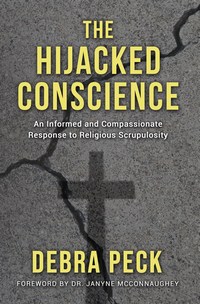 The Hijacked Conscience:
The Hijacked Conscience:
An Informed and Compassionate Response to Religious Scrupulosity
by Debra Peck
DETAILS: Publisher: SacraSage Publication Date: February 10, 2023 Format: Paperback Length: 158 pg. Read Date: June 9-16, 2024

What Exactly is RSOCD?
This book focuses on Religious Scrupulosity Obsessive-Compulsive Disorder (RSOCD) and I want to be sure that I describe it carefully and accurately. The best way to do that is to let Debra Peck do the honors (obviously, she goes into more depth, but this’ll do for starters):
The International OCD Foundation describes it as “A form of Obsessive-Compulsive Disorder (OCD) involving religious or moral obsessions. Scrupulos individuals are overly concerned that something they thought or did might be a sin or other violation of religious or moral doctrine.”’ In simplest terms, people with Scrupulosity OCD see sin where there is none.
Those who suffer from Scrupulosity usually have an overly sensitive moral conscience which causes their faith to be experienced as anxiety and fear instead of as peace. The French call it “the doubting disease.” People with Scrupulosity hold themselves to a rigorous level of spirituality and practice, not out of love or even out of obligation, but out of deep-seated fear and anxiety that not doing so imperils their eternal soul.
Like all forms of Obsessive-Compulsive Disorder, Scrupulosity is marked by unwanted and intrusive thoughts (obsessions), overwhelming anxiety that demands resolution, and either outward or internal rituals (compulsions) that relieve the anxiety for a time.
What’s The Hijacked Conscience About?
Peck tries (fairly successfully, I think) to introduce RSOCD to believers, pastors, counselors, and others to the concept. Using her own life and experiences she walks the reader through the struggles she endured (with help and hindrances from family, friends, and fellow Christians) until she was diagnosed. And how having this diagnosis—and the better treatments that came from it—have helped, and how it hasn’t (enough).
Throughout, there’s an attempt to generalize from her experience—or at least show how things she went through can be similar to things others go through.
She also brings in some of the research she and others have done about the disorder alongside her own experiences—which is essential.
I Can’t Help But Wonder…
Early on, Peck describes things that people say in response to questions and concerns raised by people with RSOCD. I’ve heard some of these given to questions by people without it—and I found them just as troublesome and almost as damaging. I put in my notes around that time—these people need a good dose of the Heidelberg Catechism (and the rest of the Three Forms of Unity/Westminster Standards). And, yes, I know—that is not a panacea here, and there’s a lot more going on than bad theology. However…it’s sure not helping them.
Peck herself says,
For those from a Wesleyan-holiness position which emphasizes that the heart can be completely cleansed from sin and living a sin-free life is the expectation of those who are “sanctified,” this can be especially debilitating.
I’ll leave it to others to deal with Wesleyen perfection and the myriad problems it has and that stem from it. But I absolutely see where it’d be debilitating to anyone honest with themselves about their spiritual condition—for someone who is compelled to be “overly concerned” with spiritual matters, debilitating seems like an understatement.
Now, people in the Wesleyan-holiness traditions don’t have a monopoly on this tendency—R. Scott Clark talks about many Evangelical strains affected by what he calls the QIRC and the QIRE—RSOCD really seems like a super-powered version of the Quest for Illegitimate Religious Certainty (with a dose of Quest for Illegitimate Religious Experience, too). Clark defines the QIRC as “the pursuit to know God in ways he has not revealed himself and to achieve epistemic and moral certainty on questions where such certainty is neither possible nor desirable.” The QIRC is problematic for anyone—you add OCD to it? And forget it—you need to fight this with medication, therapy, and better theology.
I don’t for a second believe that Reformed believers can’t struggle with this—the Heidelberg isn’t an inoculation against it. But I do wonder how it would present itself from someone within the Reformed tradition. (I’m curious about Muslims, Universalists, or Wiccans struggling with RSOCD, too).
So, what did I think about The Hijacked Conscience?
This is clearly Peck’s story—or, better, a look at RSOCD through Peck’s story. And as such, it’s good. What would’ve made this better is seeing a few other people’s stories—not the whole thing, but more. Sure, we’re told that there are others—given a couple of historical examples that are likely true, or at least possible—but as it is, it’s harder to get an idea about how RSOCD affects people who aren’t Debra Peck. It’d also be nice to see things others have done to help themselves.
Again, I know that’s not the design or intent of the book. I just think it’d have made this a stronger book—maybe that’s what a future sequel holds? (I don’t know if Peck has plans/intentions for a follow-up, I’m just spitballing here)
But as for the book we do have? It was good—it’s a solid introduction to the concept of RSOCD, a good look at how undiagnosed/untreated it can affect a person, and how—with help—someone can cope (for lack of a better term) with it. There’s even a nice little discussion on the use of medications for this, and similar, afflictions.
The writing is clear and approachable—frequently engaging and pleasant. There’s nothing to be daunted about here, just a good primer to help you weep with those who weep.




Read Irresponsibly, but please Comment Responsibly